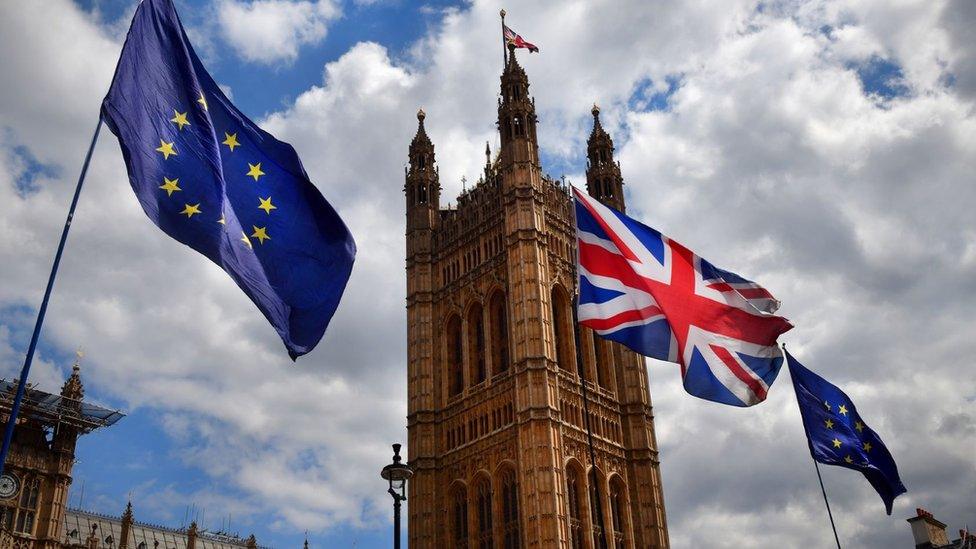Minister Kemi Badenoch defends climbdown over EU laws deadline
- Published

The business secretary has defended a government climbdown on its plan to get rid of EU-era laws copied over after Brexit.
Ministers announced last month they had ditched a December deadline for the laws to expire automatically, unless kept or replaced.
At a Commons committee, Kemi Badenoch was criticised for making the U-turn over the Retained EU Law Bill.
But she said the deadline had created uncertainty, and jeopardised reform.
She denied the government had ever promised a "bonfire" of regulations before the end of the year, adding she was "not an arsonist".
She was speaking shortly before the government suffered two defeats on the bill in the House of Lords, which is scrutinising the draft law.
The UK incorporated thousands of EU laws into UK law to minimise disruption to businesses when the UK officially left the EU in 2020.
An ongoing audit by officials has identified nearly 5,000 so far - around half of which are either environmental or transport regulations.
The Retained EU Law Bill, announced under Liz Truss, initially included a 31 December deadline for these laws to expire automatically, unless the government specifically decided to retain or replace them.
But in May, around three months after she took over responsibility for the bill on her appointment as business secretary, Ms Badenoch announced the deadline would be ditched.
This was welcomed by business groups and trade unions, which had warned the deadline could lead to laws vanishing by accident.
But at the Commons European Scrutiny Committee, she was criticised for making the move by Brexit-backing Conservative MPs.
'Disrespectful'
One, former cabinet minister David Jones, said he found it "difficult to understand" why the deadline had been scrapped.
In testy exchanges with Ms Badenoch, he accused her of being "disrespectful" towards MPs in scrapping the deadline by amending the bill in the House of Lords, after MPs had originally backed it in January.
But Ms Badenoch, who also backed Leave in the Brexit referendum, said the review process she had inherited was "too opaque" and had created uncertainty for British businesses.
She said this had led the officials reviewing EU-era legislation to prioritise "things that needed to be kept".
"I looked at the timeline, and I just didn't think that this was a good use of their time," she told the committee.
She added that her alternative approach, of outlining a list of 600 EU laws the government wants to scrap by the end of the year, would allow ministers to "push more" for changes.
The government says a further 1,000 EU laws have already been replaced or scrapped, with another 500 due to disappear under a separate bill on financial services.
"I don't think a bonfire of regulations is what we wanted. What we wanted was the reform and removal of things we did not need," she added.
Lords defeats
Another Brexit-backing Tory MP, Richard Drax, asked whether scrapping the deadline was "part of the deal" with the EU for Prime Minister Rishi Sunak clinch his new Brexit deal for Northern Ireland.
It was "in my DNA" to "smell a stitch-up" whenever the EU is mentioned, he added.
Ms Badenoch denied this, adding that the Northern Ireland deal - announced in February - had had "nothing to do with it".
The bill is continuing its progress through Parliament, with MPs and peers locked in a tussle over the final shape the legislation will have.
Peers have criticised the bill because it would allow ministers to amend or replace EU laws using secondary legislation, a fast-track process that attracts less scrutiny in Parliament.
On Tuesday, they backed an amendment that would allow MPs and peers to further scrutinise EU-era laws whose removal is flagged as contentious by a Commons committee.
They also backed an amendment that would force the government to consult outside experts before scrapping EU environmental laws, and to explain how this would not lower standards.
The changes are scheduled to be debated by the Commons next week.
Related topics
- Published18 January 2023
